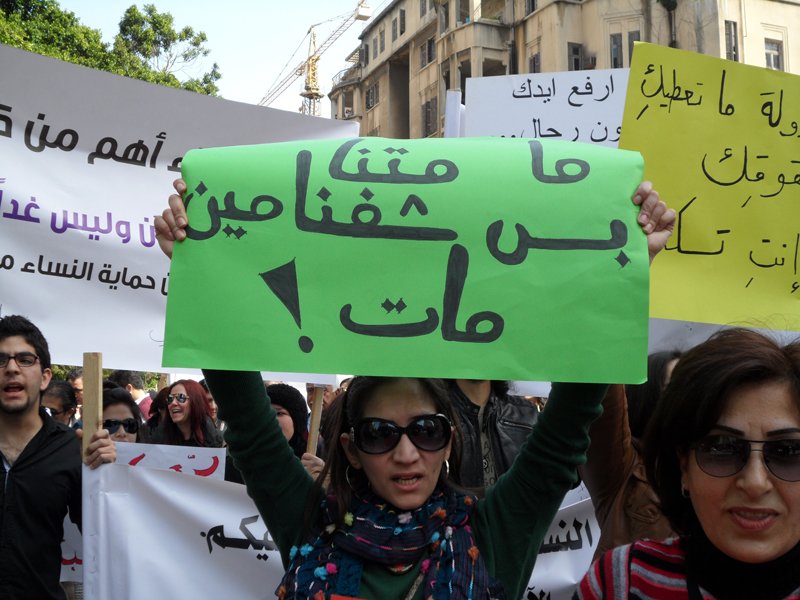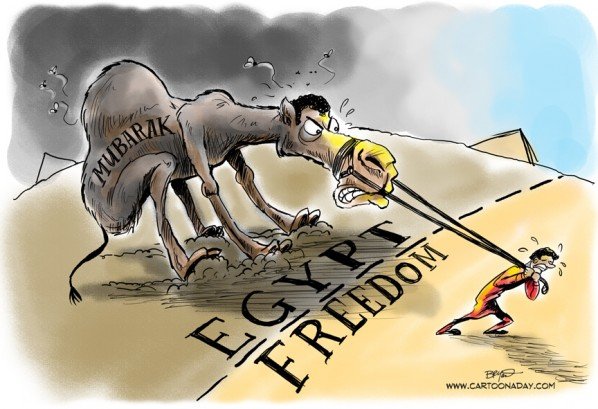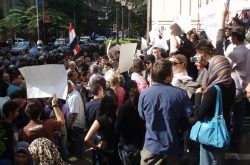Last week a Middle East version of veteran American publication Newsweek was launched by the Dubai-based Pakistani broadcasting company ARY Digital Network. This marks the eighth international edition of the 82-year-old publication. We speak with senior deputy editor Leila Hatoum about the new venture. (Arab Media & Society)
Read More »Oct. 30, 2015 – Controversial TV anchorwoman Riham Saeed resigns as channel suspends her show
Al-Nahar TV Network announced Friday the suspension of Sabaya al-Kheir TV program hosted by controversial anchorwoman Riham Saeed, who resigned amid public outrage against her for airing personal photos of a guest on her show without her permission. Last Tuesday, Saeed hosted Somaya Tarek, who claims to have been harassed by a man in a Heliopolis mall. On her show, Saeed appeared to defend the man and blame the woman, implying that Tarek "had brought it on herself." (Aswat Masriya)
Read More »What is There to Celebrate?
It was recently announced that Arab “media experts” are planning to “celebrate” Arab Media Day on April 21, 2016. The theme for the first day of what is meant to become an annual tradition is “The role of the [Arab] media in combating terrorism”. The mockery is surely multi-faceted. One …
Read More »Building Narratives: A Study of Terrorism Framing by Al Jazeera and Al Arabiya TV Networks
Using framing theory and content analysis, Saeed Abdullah & Mokhtar Elareshi investigate how Al Jazeera and Al Arabiya TV networks cover terrorism. This paper focuses on how the two networks differ or are similar in covering terrorism and identifies factors that may influence each network’s news selection processes and the framing of terrorism stories. This work represents an initial effort to expand research on terrorism coverage by pan-Arab media.
Read More »Digital Activism: Efficacies and Burdens of Social Media for Civic Activism
In a comprehensive study of social media usage among social movement organizations in Lebanon, Jad Melki and Sarah Mallat investigate the efficacy of digital technology as a tool for activism. The authors find that while social media platforms offer a number of perceived benefits to activism work, there remain significant obstacles that manifest both on and offline.
Read More »Mubarak Framed! Humor and Political Activism before and during the Egyptian Revolution
In an entertaining and insightful read, Deepa Anagondahalli and Sahar Khamis delve into the world of Egyptian political humor, unpacking its historical roots and reflecting on its evolution from private banter to public resistance. Focusing on Mubarak’s presidency and subsequent ouster, the authors identify a stark shift from long narrative jokes, to the biting “weaponized” one-liners that emerged in his final days. Humor, they conclude, is a paradoxical yet powerful tool for activism, which despite more recent crackdowns has proven to be a relatively safe platform for dissent.
Read More »Navigating the Ethics of Citizen Video: The Case of a Sexual Assault in Egypt
Using video of a sexual assault in Tahrir Square as a case study, Madeleine Bair discusses the ethical and logistical considerations of citizen video as a means for social documentation. Bair points to the emergent challenges including reliability, consent, preservation and security, as citizen videos are sourced with increasing regularity by both new and traditional media. The Egyptian video, which sparked national change and international outrage, is a striking example of how citizen video can both shine light on an issue and stir controversy.
Read More »Framing April 6: Discursive dominance in the Egyptian print media
The strikes in Egypt held on 6 April 2008 had mixed results – but you wouldn’t know that from reading the country’s main papers. Aaron Reese analyzes how the Egyptian press framed coverage for and against the protesters.
Read More »Reality Television and Politics in the Arab World: Preliminary Observations
In the wake of controversy triggered by Super Star and Star Academy, some observers have hailed reality television as a harbinger of democracy in the Arab world. Marwan Kraidy looks at the political implications of a new and popular genre hitting Arab satellite television.
Read More »A Potential Untapped? Why Dubbing Has Not Caught on in the Arab World
Abstract This paper examines the commercial and cultural reasons the dubbing of American films and television programs, common throughout much of the world, remains non-existent in the Arab World. Despite a marked surge in the number of Arabic-language television stations in the last ten years, and much need for quality …
Read More » Arab Media & Society The Arab Media Hub
Arab Media & Society The Arab Media Hub






